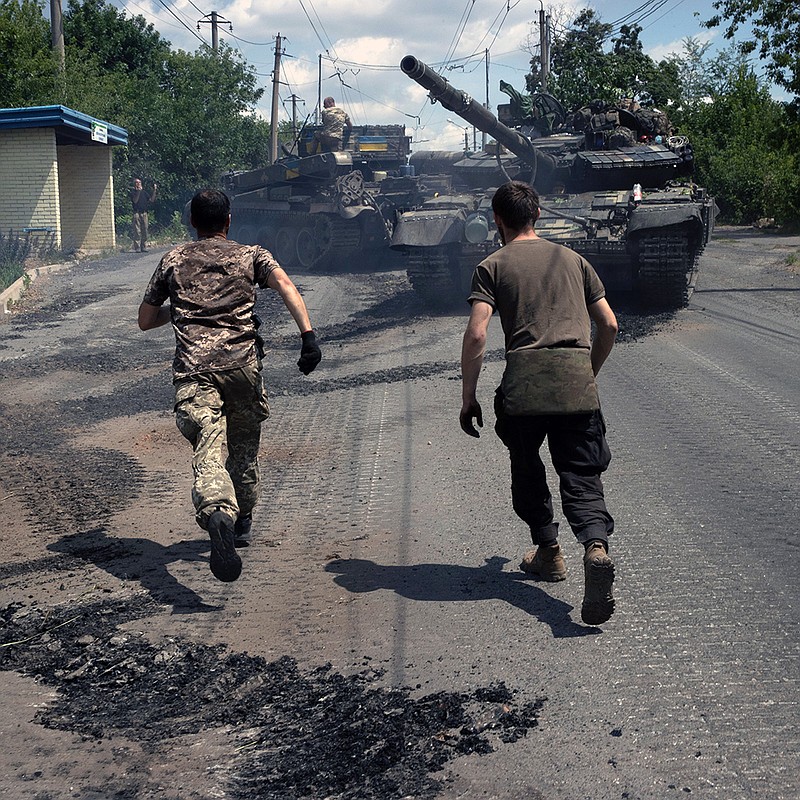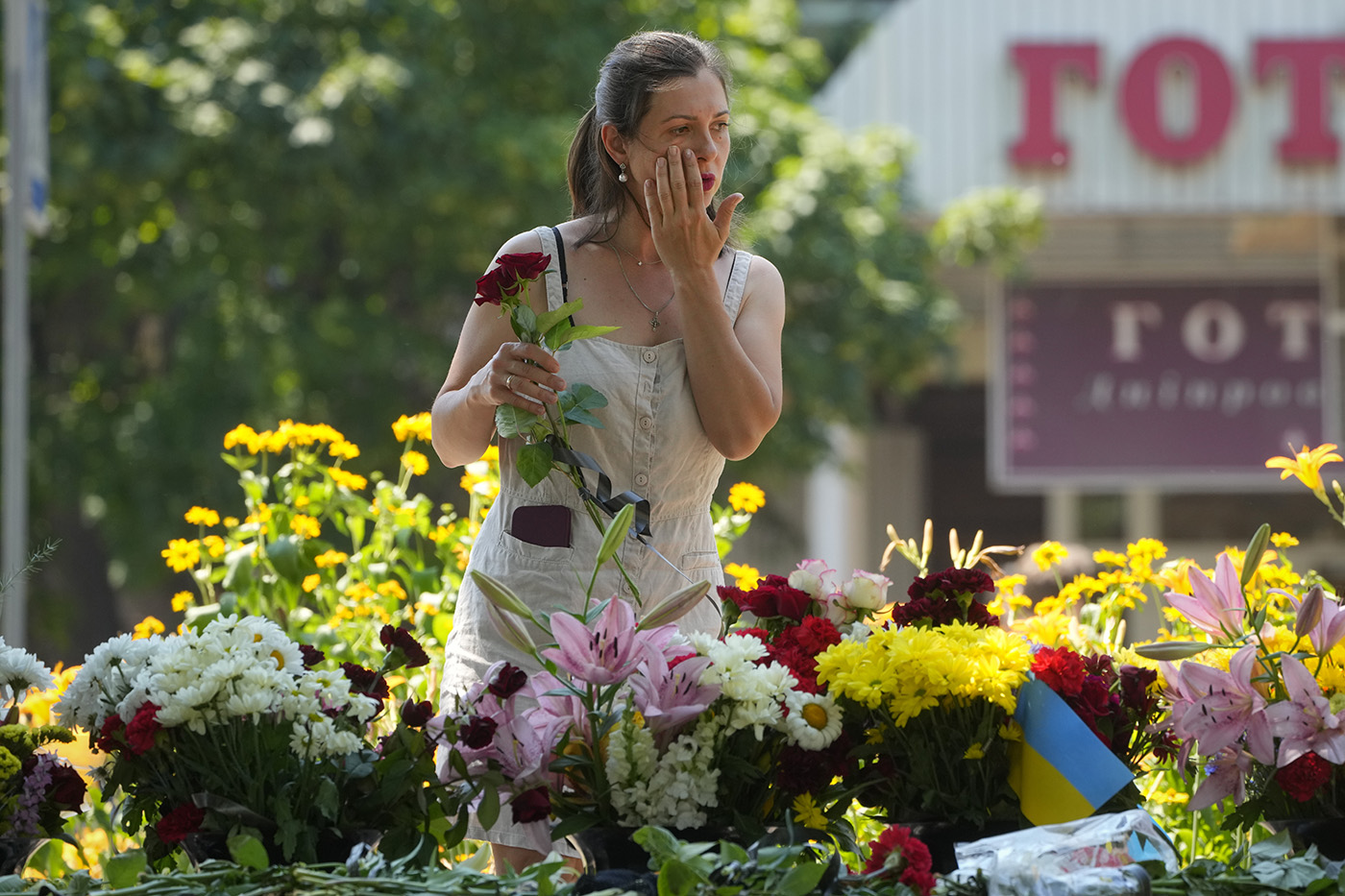Ukrainian officials announced the largest prisoner exchange since Russia's invasion, saying 144 soldiers were being returned to Ukraine, including dozens who defended Mariupol, a southern port city that became a symbol of Russian repression and Ukrainian defiance.
While the exchange has been shrouded in secrecy, Denis Pushilin, the head of Russian proxy forces in the Donetsk region in eastern Ukraine, said that the same number of Russian and pro-Russian forces were returned in the deal.
More than 2,500 Ukrainian soldiers surrendered in mid-May after holding out for months in bunkers beneath the sprawling Azovstal steel factory in Mariupol. Their surrender was carefully negotiated between Russia, Ukraine and international mediators and marked the end of one of the war's most brutal battles.
While Ukraine and Russia have exchanged prisoners on several occasions -- including 17 Ukrainians returned in an exchange announced this week -- the fate of the garrison from Mariupol has been among the most sensitive issues of the war.
When the Ukrainian government issued the surrender directive, it vowed to do all it could to ensure they would be returned home.
The Kremlin had long sought to use the far-right origins of the Azov regiment, which played a lead role in the defense of the city, as proof of its false claim that the Ukrainian state has been infected with Nazism.
After the surrender in Mariupol, some Russian lawmakers were quick to call for the death penalty and proposed a ban on any exchange of prisoners that would allow members of the Azov regiment to go free.
In a statement, Ukraine's main intelligence directorate said that 95 defenders of the Azovstal steel factory, including 43 from the Azov regiment, had been released during the exchange. Most of the exchanged soldiers had been seriously injured, the statement said, including some that have fractures, burns and amputated limbs.
Yulia Fedosiuk, whose husband, Arseniy Fedosiuk, is a sergeant in the Azov regiment and one of roughly 1,000 Azov soldiers being held by Russia, said that according to her understanding, the first step in the exchange process was to trade bodies of the dead.
Next, she said, the injured are being exchanged, which is what is taking place now. Finally, she said, soldiers considered fit for combat, like her husband, would be traded.
Like most of the other prisoners, she said, her husband is being held in a pretrial detention center in Olenivka, in the Russian-occupied part of the Donetsk region. She spoke to him 10 days ago.
The two had worked out a secret code he could flash in the event he was captured and something was wrong. "He didn't make the signal," she said.
"He said that everything was fine," she said, but she knew that was not the case. "I saw that everything was not fine," she said. "Many of his friends died. His commander was killed."
Included in the exchange are a husband and wife, both soldiers with the Azov regiment, according to Kyrylo Budanov, chief of the defense intelligence of Ukraine. The husband was captured at Azovstal. His wife was captured earlier in a different location. They have two children.
"The children were living without their parents," Budanov said. "We insisted" that the Russians give them over, Budanov added.
The commanders of the Azov regiment and a marine infantry unit who fought at Azovstal have been moved to Moscow, where they are being held at the notorious Lefortovo Prison, according to Budanov. He said that among those being detained are Lt. Col. Denys Prokopenko, the head of the Azov regiment at Azovstal, and Capt. Svyatoslav Palamar, his deputy, along with Maj. Serhiy Volyna, commander of the 36th Separate Marine Brigade.
FIGHT FOR DONBAS
Meanwhile, Russian forces battled Wednesday to surround the Ukrainian military's last stronghold in a long-contested eastern province, as shock reverberated from a Russian airstrike on a shopping mall that killed at least 18 in the center of the country two days earlier.
Moscow's battle to wrest the entire Donbas region from Ukraine saw Russian forces pushing toward two villages south of Lysychansk while Ukrainian troops fought to prevent their encirclement.
Britain's defense ministry said Russian forces were making "incremental advances" in their offensive to capture Lysychansk, the last city in the Luhansk province under Ukrainian control after the retreat of Ukraine's forces from the neighboring city of Sievierodonetsk.
Russian troops and their separatist allies control 95% of Luhansk and about half of Donetsk, the two provinces that make up the mostly Russian-speaking Donbas.
The latest assessment by the Institute for the Study of War, a Washington-based think tank, said the Ukrainians were likely in a fighting withdrawal to seek more defensible positions while draining the Russian forces of manpower and resources.
Avril Haines, the U.S. director of national intelligence, said Russia "may think time is on its side" due to the escalating costs borne by the West and fatigue as the war grows longer. The most likely scenario predicted by American intelligence, Haines said, is a "grinding struggle" in which Russia consolidates its hold over southern Ukraine by the fall.
The U.S. correctly predicted Russia would invade Ukraine in February, but was wrong in assessing that it would quickly seize Kyiv. Speaking at an event in Washington on Wednesday, Haines said Russian President Vladimir Putin "has effectively the same political goals that he had previously, which is to say that he wants to take most of Ukraine" and push it away from NATO.
"We perceive a disconnect between Putin's near-term military objectives in this area and his military's capacity, a kind of mismatch between his ambitions and what the military is able to accomplish," Haines said.
Putin also said his goals in Ukraine have not changed since the start of the war. He said they were "the liberation of the Donbas, the protection of these people and the creation of conditions that would guarantee the security of Russia itself." He made no mention of his original stated goals to "demilitarize" and "de-Nazify" Ukraine.
He denied Russia adjusted its strategy after failing to take Kyiv. "As you can see, the troops are moving and reaching the marks that were set for them for a certain stage of this combat work. Everything is going according to plan," Putin said.
Meanwhile, crews continued to search through the rubble of the shopping mall in Kremenchuk where Ukrainian authorities say 20 people remain missing.
Ukrainian State Emergency Services press officer Svitlana Rybalko told reporters that along with the 18 people killed, investigators found fragments of eight more bodies. It was not immediately clear whether that meant there were more victims. A number of survivors suffered severed limbs.
"The police cannot say for sure how many (victims) there are. So we are finding not the bodies but the fragments of bodies," Rybalko said. "Now we are clearing at the very epicenter of the blast. Here, we practically cannot find bodies as such."
Several families stood by what was left of the Amstor shopping center Wednesday morning in hope of finding missing loved ones.
"This is pure genocide," local resident Tatiana Chernyshova said while going to lay flowers at the site. "Such things cannot happen in the 21st century."
"We need to engage everyone to help stop the war, help us fight these scum -- these Russian aggressors," Chernyshova said.
Psychologists working at the site with families said they were trying to help people come to terms with their loss.
"We are trying to help them release their emotions now, as later it becomes harder and much more painful," said one psychologist, who did not give his name.
After the attack on the mall, Ukrainian President Volodymyr Zelenskyy accused Russia of becoming a "terrorist" state. On Wednesday, he reproached NATO for not embracing or equipping his embattled country more fully.
"The open-door policy of NATO shouldn't resemble old turnstiles on Kyiv's subway, which stay open but close when you approach them until you pay," Zelenskyy told NATO leaders meeting in Madrid, speaking by video link. "Hasn't Ukraine paid enough? Hasn't our contribution to defending Europe and the entire civilization been sufficient?"
He asked for more modern artillery systems and other weapons and warned the NATO leaders they either had to provide Ukraine with the help it needed to defeat Russia or "face a delayed war between Russia and yourself."
Russian foreign ministry spokeswoman Maria Zakharova on Wednesday dismissed what she claimed was the Ukrainian government's "blatant provocation" in trying to blame the mall missile strike on Russia's military.
Britain's defense ministry said there was a "realistic possibility" that the mall strike "was intended to hit a nearby infrastructure target."
"Russian planners highly likely remain willing to accept a high level of collateral damage when they perceive military necessity in striking a target," the ministry said. "It is almost certain that Russia will continue to conduct strikes in an effort to interdict the resupplying of Ukrainian front-line forces."
Russia's military also is experiencing a shortage of more modern precision strike weapons, which is compounding civilian casualties, the British ministry said.
In southern Ukraine, a Russian missile strike on a multi-story apartment building Wednesday in the city of Mykolaiv killed at least four people and injured five, regional governor Vitaliy Kim said. Mykolaiv is a major port and seizing it -- as well as Odesa farther west -- would be key to Russia's objective of cutting off Ukraine from its Black Sea coast.
Russia's defense ministry said in a statement that the missile strike on Mykolaiv targeted a base for training "foreign mercenaries," as well as ammunition depots.
Information for this article was contributed by Michael Schwirtz, Marc Santora and Ivan Nechepurenko of The New York Times and Francesca Ebel, Yuras Karmanau, Frank Griffiths, Sylvia Hui, Maria Grazia Murru, Samuel Petrequin and Nomaan Merchant of The Associated Press.
Gallery: Images from Ukraine, month 5

